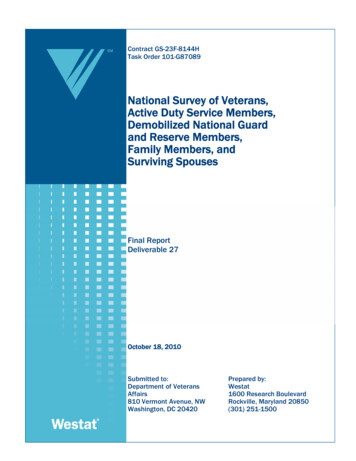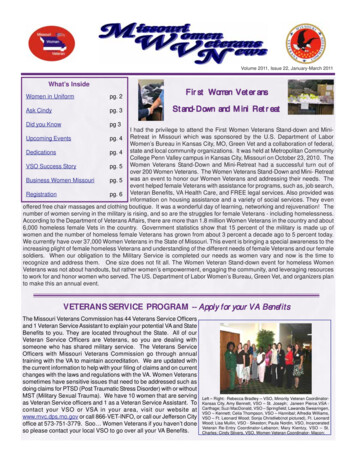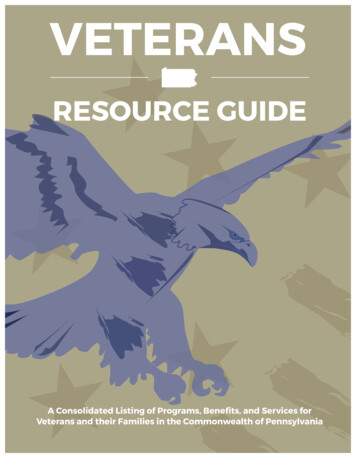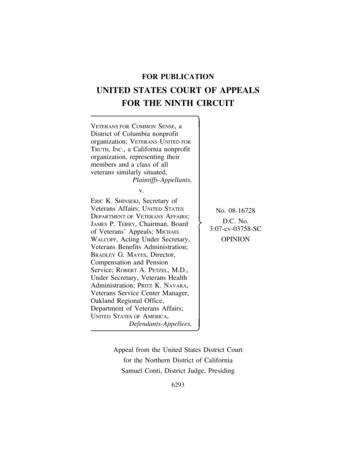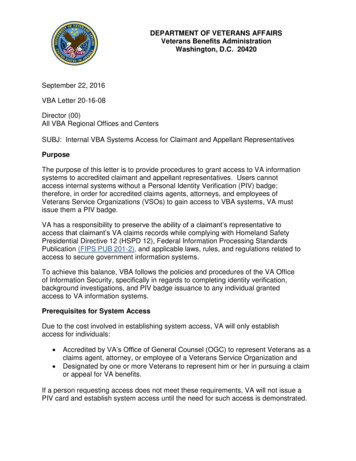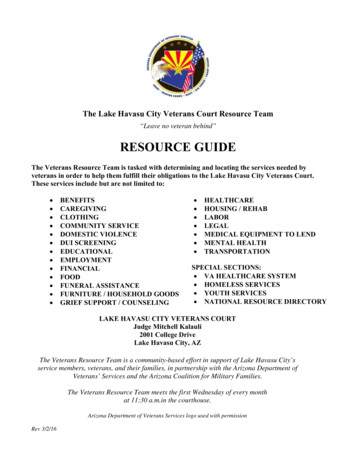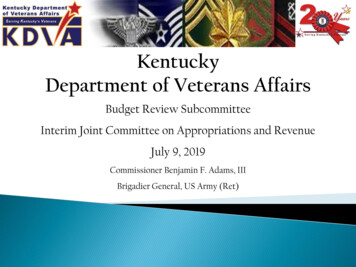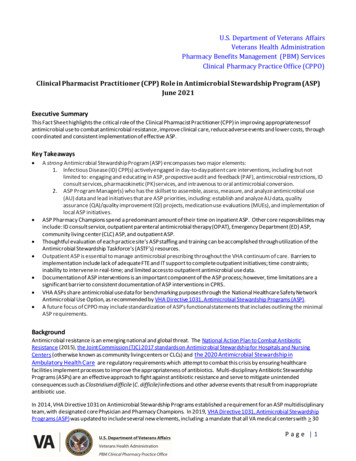
Transcription
U.S. Department of Veterans AffairsVeterans Health AdministrationPharmacy Benefits Management (PBM) ServicesClinical Pharmacy Practice Office (CPPO)Clinical Pharmacist Practitioner (CPP) Role in Antimicrobial Stewardship Program (ASP)June 2021Executive SummaryThis Fact Sheet highlights the critical role of the Clinical Pharmacist Practitioner (CPP) in improving appropriateness ofantimicrobial use to combat antimicrobial resistance, improve clinical care, reduce adverse events and lower costs, throughcoordinated and consistent implementation of effective ASP.Key Takeaways·······A strong Antimicrobial Stewardship Program (ASP) encompasses two major elements:1. Infectious Disease (ID) CPP(s) actively engaged in day-to-day patient care interventions, including but notlimited to: engaging and educating in ASP, prospective audit and feedback (PAF), antimicrobial restrictions, IDconsult services, pharmacokinetic (PK) services, and intravenous to oral antimicrobial conversion.2. ASP Program Manager(s) who has the skillset to assemble, assess, measure, and analyze antimicrobial use(AU) data and lead initiatives that are ASP priorities, including: establish and analyze AU data, qualityassurance (QA)/quality improvement (QI) projects, medication use evaluations (MUEs), and implementation oflocal ASP initiatives.ASP Pharmacy Champions spend a predominant amount of their time on inpatient ASP. Other core responsibilities mayinclude: ID consult service, outpatient parenteral antimicrobial therapy (OPAT), Emergency Department (ED) ASP,community living center (CLC) ASP, and outpatient ASP.Thoughtful evaluation of each practice site’s ASP staffing and training can be accomplished through utilization of theAntimicrobial Stewardship Taskforce’s (ASTF’s) resources.Outpatient ASP is essential to manage antimicrobial prescribing throughout the VHA continuum of care. Barriers toimplementation include lack of adequate FTE and IT support to complete outpatient initiatives; time constraints;inability to intervene in real-time; and limited access to outpatient antimicrobial use data.Documentation of ASP interventions is an important component of the ASP process; however, time limitations are asignificant barrier to consistent documentation of ASP interventions in CPRS.VHA ASPs share antimicrobial use data for benchmarking purposes through the National Healthcare Safety NetworkAntimicrobial Use Option, as recommended by VHA Directive 1031, Antimicrobial Stewardship Programs (ASP).A future focus of CPPO may include standardization of ASP’s functional statements that includes outlining the minimalASP requirements.BackgroundAntimicrobial resistance is an emerging national and global threat. The National Action Plan to Combat AntibioticResistance (2015), the Joint Commission (TJC) 2017 standards on Antimicrobial Stewardship for Hospitals and NursingCenters (otherwise known as community living centers or CLCs) and the 2020 Antimicrobial Stewardship inAmbulatory Health Care are regulatory requirements which attempt to combat this crisis by ensuring healthcarefacilities implement processes to improve the appropriateness of antibiotics. Multi-disciplinary Antibiotic StewardshipPrograms (ASPs) are an effective approach to fight against antibiotic resistance and serve to mitigate unintendedconsequences such as Clostridium difficile (C. difficile) infections and other adverse events that result from inappropriateantibiotic use.In 2014, VHA Directive 1031 on Antimicrobial Stewardship Programs established a requirement for an ASP multidisciplinaryteam, with designated core Physician and Pharmacy Champions. In 2019, VHA Directive 1031, Antimicrobial StewardshipPrograms (ASP) was updated to include several new elements, including: a mandate that all VA medical centers with 30Page 1
beds shall enroll in the CDC NHSN AU (National Health Safety Network Antimicrobial Utilization) Module and that eachcenter’s designated ASP Physician and Pharmacist Champion’s names and contact information be uploaded to the ASTFSharePoint site by January 2020. This directive created a need for facilities to identify Clinical Pharmacist Practitioner (CPP)and Clinical Pharmacists (CP) with ASP or Infectious Diseases (ID) training to have dedicated and protected time for ASPactivities.The Veterans Health Administration (VHA) also responded to the need for Antimicrobial Stewardship by the creation of theVHA National Antimicrobial Stewardship Task Force (ASTF) in 2011, a multi-disciplinary group that is co-led by the NationalInfectious Diseases Service, and VHA Pharmacy Benefits Management. The purpose was to develop, deploy and monitor anational-level strategic plan for improvements in antimicrobial therapy management. Through collaboration with VHA ASPPhysician and Pharmacist Champions, ASTF has been able to support the development and expansion of ASPs within VHA.ASTF workgroups, supported by facility volunteers have established and diffused ASP initiatives and tools to support localefforts, to educate providers and patients, and facilitate compliance with VA and non-VA requirements. These include:· Monthly educational webinars on current ID and ASP topics, and educational slide sets and flyers for patients andclinicians· Sample policies, campaigns and initiatives such as the Staphylococcus aureus Bacteremia Bundle, Avoidance ofDual-Anaerobic Therapy, Skin and Soft Tissue Infection Therapy Guidance, Intravenous to Oral AntimicrobialConversion, Anti-Methicillin Resistant Staphylococcus aureus and anti-broad spectrum gram-negative antibiotic deescalation, Pneumonia Duration of Therapy, Urinary Tract Infection (UTI) and Asymptomatic Bacteriuria (ASB)Guidance.· Tools and documents to support ASP development logistics, including: workload guidance and recommendationson skills and knowledge needed for VA ASP Champions· Links to data tools to monitor antimicrobial use developed by the ASTF that allows comparison with like facilities,as well as links to VA and non-VA requirements related to ASP· Recent ASTF/MEDSAFE Antimicrobial Medication Use Evaluations that were implemented at participating VHAfacilities include: Pneumonia and Duration of Therapy (2014), urinary tract infections and asymptomaticbacteriuria (2015), Acute Respiratory Tract Infections (2016), Uncomplicated Skin/Soft Tissue Infections (2017),and Vancomycin Initiation and Continuation (2018)The ASP SME CPPO Workgroup was developed in 2019 with plans to assess, analyze, and characterize the current state ofstrong ASP practices within the VHA. The first step towards this goal was through the development of a Query Tool toanalyze variations in practices of workgroup members and to develop a desired state of practice for ASP CPSs and ASPPharmacy Champions.Role of the CPP in Antimicrobial StewardshipThe VA CPP is an Advanced Practice Provider who is authorized, under a scope of practice, to autonomously prescribe andprovide comprehensive medication management services in a variety of practice settings as described in VHA Handbook1108.11, Clinical Pharmacy Services. After careful review of the CPP qualifications, training, and competency, the CPP SOPis approved at the facility level with oversight by the Executive Committee of the Medical Staff. The ASP CPP serves toimprove appropriateness of antimicrobial use by performing essential comprehensive medication management services inconjunction with a dedicated Physician ASP Champion, ideally with specialized training in ID and/or ASP. A strong ASPencompasses two major elements:1. ID CPP(s) actively engaged in day-to-day interventions in patient care, including: engaging and educating CPPs inASP, PAF, ID consult service, PK services, and intravenous to oral antimicrobial conversion;2. ASP Program Manager(s) who has the skillset to assemble, assess, measure, and AU data and lead initiatives thatare ASP priorities, including: establish and analyze AU data, QA/QI projects, MUEs, and implementation of local ASPinitiatives.Characteristics of current CPPs in the ASP practice area that were sampled were found on average to be comprised of 0.9FTE ASP Pharmacy Champion FTE and 0.5 FTE ASP Physician Champion FTE managing the antimicrobial pharmacotherapy ofapproximately 260 inpatients. Recommended minimum staffing requirements were established in VHA Directive 1031.(Table 1)Page 2
Table 1. Minimum FTE by Medical Facility Complexity Level.Position TitleInfectious Diseases PhysicianAntimicrobial StewardshipClinical Pharmacist –Antimicrobial StewardshipNurse Practitioner and/orPhysician Assistant –Antimicrobial Stewardship1a and 1b1c and 23AdditionalStaffing for CLC0.500.25 – 0.50.25 – 0.375See below*1.5 – 4.01.0 – 2.00.25 – 0.5**0.0 – 0.25**0.50.50.0 – 0.25See below**For this case, no specific recommendations were made by the Infectious Diseases Field Advisory Committee and the FTE for thepositions is left to the discretion of the VA medical facility**The ASTF and PBM CPPO created and validated a staffing calculator for ASP in VA medical facilities.***Funded research is encouraged but is in addition to FTE defined by clinical needRecommended Education/Training/CertificationThe ASP CPP should be trained and engaged in the day-to-day assessment of patients on antimicrobial agents, along withlongitudinal tracking of outcomes related to the ASP as described in the following monitors:····Received specialized training and/or certification in ID or ASPAbility to document successful competency in ASP and ID using a standardized competency assessment tool.Ability to track and report on ASP outcomes related to interventions and education, antibiotic use data, and otherquality/continuous improvement metricsProvide effective education to staff and patients on the importance of appropriate antibiotic use and antimicrobialresistanceSpecialized Infectious Disease training allows for further development of ASP ideologies, quality improvement practices andadvancements in appropriate use of antimicrobials along with attaining the skillset necessary to provide effectivecommunication and education to patients and other healthcare professionals. In addition to specialized residency orfellowship training, several organizations offer certificate programs in Antimicrobial Stewardship that can providefoundational knowledge in both common infectious diseases and the mechanics of leading a stewardship program,particularly in smaller facilities. For those pharmacists enrolled in a program, the VA has a site to track enrollment andprojects to help track this training within VA. In a letter from 2013, the acting Deputy Undersecretary for Health Operationsand Management, facility directors were directed to support and fund training of pharmacists in their facilities for astewardship certificate program. ASP Pharmacy Clinicians also maintain an active role in academia and research. ManyVAMCs are affiliated with a large, academic medical center where ASP Pharmacy Clinicians maintain active facultyappointment and/or are involved in teaching and research.Current Assessment of Clinical Pharmacist Practice in Antimicrobial StewardshipNationwide, CPPs are integrated into care teams throughout VHA, delivering care through a variety of modalities, including:face-to-face, phone, and virtual care. Under the VHA Directive 1031, all VHA sites are required to have an ASP PharmacyChampion, defined as a facility-designated clinical pharmacist/clinical pharmacy specialist assigned to co-lead the ASP withthe ASP Provider Champion. At this time, 168 ASP Pharmacy Stewardship Champions are actively engaged in theoptimization of antimicrobial prescribing across the VHA. Interventions by ASP Pharmacists are captured utilizing the chartnote, and at some facilities these interventions are also captured utilizing antimicrobial surveillance software, spreadsheets,and other databases. The frequency of documentation utilizing Pharmacists Achieve Results with MedicationsDocumentation (PhARMD) Tool has exponentially increased since FY16, with 127,365 PharmD Tool ASP interventionsdocumented in FY18 by all VHA CPPs. There also continues to be a steady increase in the number of ASP encounters in boththe inpatient and outpatient setting with over 51,000 encounters in FY18, compared to only 22,077 encounters by CPPs inFY14. (Figure 1)Page 3
Figure 1. VHA Pharmacist Infectious Disease Encounters, FY13 – 6,0005,0004,0003,0002,0001,0000FY QUARTER*These encounters are not exclusive to ASP. These encounters also include: HIV, HIV Pre-exposure Prophylaxis, Hepatitis C, etc.ASP Champion responsibilities include, but are not limited to: inpatient antimicrobial stewardship, ID consult service,outpatient parenteral antimicrobial therapy (OPAT), outpatient antimicrobial stewardship, CLC antimicrobial stewardship,Emergency Department stewardship, and travel patients.ASP Pharmacy Champions are engaged in the implementation of facility level inpatient and outpatient stewardshipinterventions. Buy-in from key stakeholders is necessary for the growth of ASPs. To allow for efficient acceptance of ASPinterventions, relationships with prescribers and other healthcare providers including nurses, pharmacists, microbiologists,infection preventionists, and leadership are essential. Documentation of these interventions to optimize antimicrobial drugselection, dose, route, frequency, duration, and indication are a core element of a successful ASP and also a method ofcommunicating ASP interventions. (Figure 2) Frequency and methodology of ASP interventions varies among institutions.Other essential components of a successful ASP include participation in the creation and dissemination of the facilityantibiogram and restriction of specific antimicrobials to ASP and/or ID approval (e.g., fluoroquinolones, carbapenems, andother drugs directed at multidrug resistant organisms). Many ASP Pharmacy Champions also participate in VISN-level ASPWorkgroups.Reporting of antimicrobial use metrics through the NHSN AU Option allows for comparison of antimicrobial use data amongsimilar facilities. Benchmarking of antimicrobial use data allows for identification of future ASP initiatives and goals.Page 4
Figure 2. VHA CPRS PharmD ASP Interventions Documented, FY16 – 18PharmD Tool 0000400002000011,7740FY16FY17FY18Outpatient Antimicrobial Stewardship InterventionsThe nature of outpatient prescribing makes providing immediate feedback to providers challenging, as often the decision toprescribe antimicrobials has already been made prior to CPP involvement. TJC ambulatory health care organizationstandards will increase the focus on outpatient antimicrobial, with expectations including development of annualoutpatient ASP goal(s). Some sites have implemented the ASTF/Academic Detailing Acute Respiratory Tract InfectionInitiative, but other outpatient initiatives are possible. Potential outpatient ASP goals may include:·········Provider Education (including prescribing practices, scorecards, academic detailing)Initiatives targeting disease states, such as: sexually transmitted diseases, asymptomatic bacteriuria, Clostridiumdifficile infections, and skin/soft tissue infectionsDevelopment of outpatient ASP order sets that support antimicrobial restrictionsIncorporation of rapid molecular diagnosticsAntimicrobial restrictions (e.g. fluoroquinolones)MUEs on targeted antimicrobialsAllergy testingIncreased availability of ASP services through e-consults and pagersASP opportunities identified by surveillance softwareCost and Clinical Outcomes of Antimicrobial Stewardship ProgramsIn a VAMC systematic review by Filice et al., ASP interventions intended to optimize antimicrobial prescribing and/or reduceexcessive antimicrobial prescribing were not found to significantly impact hospital length of stay, hospital readmission, ormortality. Interventions to increase ID guideline compliance were found to significantly reduce mortality. Totalantimicrobial prescribing decreased by 24.7% utilizing persuasive ASP interventions (education, reminders, prospectiveaudit and feedback, educational outreach) and 40.5% utilizing restrictive ASP interventions (requirement of ID expertapproval of antimicrobials). This reduction in antimicrobial prescribing ranging from 24.7 – 40.5% of all prescribedantimicrobials is associated with significant cost-savings.Conclusions and RecommendationsAntimicrobial resistance is a compelling global health crisis that requires implementation and sustainment of ASP initiatives,tracking and trending of results, and sharing of these results with key stake holders. The VA continues to combatinappropriate antimicrobial prescribing through coordinated and consistent implementation of effective ASP.VHA has strived to implement and sustain strong practices within the ASP arena, with the clinical pharmacy specialistsserving a very important role across the continuum of care from inpatient to outpatient. However, there continue to beopportunities related to further expansion of program goals. Expansion of inpatient ASPs could include formal ASPPage 5
responsibilities for CPPs. These rounding CPPs play a critical role in ASP by impacting prescribing practices at the time theprescribing decision is made. Expansion of outpatient ASPs could include formal ASP responsibilities of Academic Detailers.Some barriers that have been identified include expansion of ASP CPP FTE, Information Technology (IT) Support, and lack ofancillary support staff. To assist in the expansion and sustainment of VA Antimicrobial Stewardship Programs, the updatedVHA Antimicrobial Stewardship Directive 1031 offers staffing recommendations for ASP FTE based on facility acuity andsize. A staffing calculator was applied by ASTF in collaboration with CPPO to develop suggested staffing guidance. Thesetools should be used to garner FTE to support ASP services within VA facilities. Furthermore, despite the importance ofdocumenting ASP interventions, almost all respondents felt that there was lack of adequate time allotted to document ASPinterventions.Following the release of the inpatient TJC antimicrobial stewardship standards in January 2017, ASP resources werededicated to inpatient ASP activities. Recommendations for outpatient expansion are evident, as TJC ambulatory healthcare organization standards requirements go into effect in January 2020. Thus, medical centers are encouraged to evaluatetheir outpatient ASP resources and policy needs to prepare. Future outpatient stewardship initiatives are encouraged inthis vulnerable area.Questions related to this guidance may be directed to the Clinical Pharmacy Practice Office (CPPO) at VHAPBH ClinicalPharmacy Practice Office (CPPO) es1.2.3.4.5.6.7.VHA Directive 1031, Antimicrobial Stewardship ProgramsBarlam TF, Cosgrove SE, Abbo LM, et al. Implementing an Antibiotic Stewardship Program: Guidelines by the Infectious Diseases Society ofAmerica and the Society for Healthcare Epidemiology of America. Clin Infect Dis 2016; 62:e51.Kelly A, Jones M, Echevarria K, et al. A Report of the Efforts of the Veterans Health Administration National Antimicrobial Stewardship Initiative.Infection Control Hosp Epidemiol 2017;1-8.Filice G, Drekonja D, Greer N, et al. Antimicrobial Stewardship Programs in Inpatient Settings: A Systematic Review [Internet]. Washington (DC):Department of Veterans Affairs (US); 2013 Sep.The Essential Role of Pharmacists in Antimicrobial Stewardship. Infect Control Hosp Epidemiol 2016. DOI: 10.1017/ice.2016.82Sanchez GV, Fleming-Dutra KE, Roberts RM, Hicks LA. Core Elements of Outpatient Antibiotic Stewardship. MMWR Recomm Rep 2016; 65:1.Fleming-Dutra KE, Hersh AL, Shapiro DJ, et al. Prevalence of Inappropriate Antibiotic Prescriptions Among US Ambulatory Care Visits, 20102011. JAMA 2016; 315:1864.Page 6
Antimicrobial resistance is an emerging national and global threat. The National Action Plan to Combat Antibiotic Resistance (2015), the Joint Commission (TJC) 2017 standards on Antimicrobial Stewardship for Hospitals and Nursing Centers (otherwise known as community living centers or CLCs) and the 2020 Antimicrobial Stewardship in

